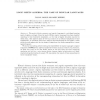Free Online Productivity Tools
i2Speak
i2Symbol
i2OCR
iTex2Img
iWeb2Print
iWeb2Shot
i2Type
iPdf2Split
iPdf2Merge
i2Bopomofo
i2Arabic
i2Style
i2Image
i2PDF
iLatex2Rtf
Sci2ools
102
click to vote
CORR
2007
Springer
2007
Springer
Logic Meets Algebra: the Case of Regular Languages
The study of finite automata and regular languages is a privileged meeting point of algebra and logic. Since the work of Büchi, regular languages have been classified according to their descriptive complexity, i.e. the type of logical formalism required to define them. The algebraic point of view on automata is an essential complement of this classification: by providing alternative, algebraic characterizations for the classes, it often yields the only opportunity for the design of algorithms that decide expressibility in some logical fragment. We survey the existing results relating the expressibility of regular languages in logical fragments of MSO[S] with algebraic properties of their minimal automata. In particular, we show that many of the best known results in this area share the same underlying mechanics and rely on a very strong relation between logical substitutions and blockproducts of pseudovarieties of monoid. We also explain the impact of these connections to circuit ...
Related Content
| Added | 13 Dec 2010 |
| Updated | 13 Dec 2010 |
| Type | Journal |
| Year | 2007 |
| Where | CORR |
| Authors | Pascal Tesson, Denis Thérien |
Comments (0)

